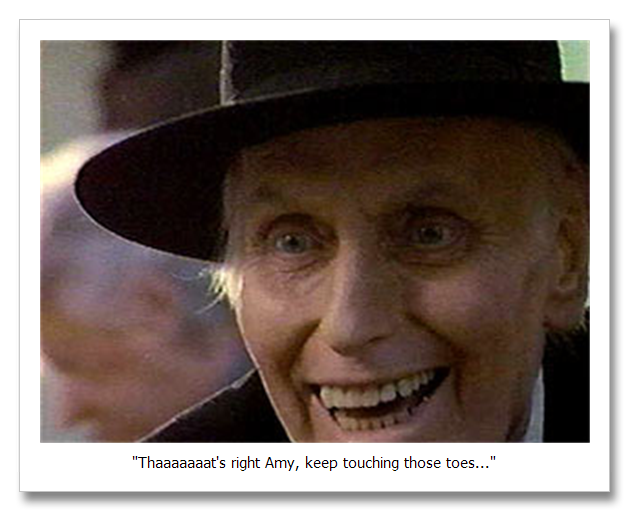Good Teachers...
1. Treat you like a human being, but don't try to be your friend. They maintain that distance that marks them as a figure of authority without trying to be your buddy. However, they're definitely there to be a shoulder for you to cry on, or to give you advice when everything seems to be falling apart.
2. Make efficient use of class time. They don't ramble on and on about their personal lives, or let the class get away with fooling around for the whole lesson so that the work isn't covered. They use the time allocated to them for the lesson, no more, but sometimes less (if everyone is cooperating and quick to get the hang of the content) without making unreasonable demands that you line up ten minutes before the lesson begins, and so on. In fact, not being unreasonable is another thing good teachers do.
3. Keep their political, religious or cultural beliefs private, not letting it influence their treatment of the students. An anecdotal example of this going wrong is something that happened to some friends of mine who, as everyone does in high school, began to explore their gender identity and sexuality. When this did not conform to the conservative beliefs of some of the teachers at the Christian, all-girl school we went to, these girls were singled out, humiliated, and treated like criminals. Other girls who were lucky not to get "caught" became even more afraid of "coming out". I think it's hard enough realising that you're gay, bi or trans in high school without the adults, the ones who are supposed to be your support system, your source of advice and guides through the difficult time that is your teens, being so caught up in their own beliefs that they fail to provide you with that support.
4. Encourage students without playing favourites. When there's a particularly bright, funny, or attractive kid in the class, it's easy for the teacher to give them all their attention. I think that is to the detriment of the other students, who may feel that they shouldn't even bother. It can also be detrimental to the "favourite" as the rest of the class might resent them, and may exclude them socially.
5. Are passionate about the subject they teach, and creative & involved in the teaching of it. I had some teachers who devised elaborate games and projects for us that made the learning experience fun and engaging, while other teachers simply read from a text book, in a monotonous voice, that revealed that they would rather be anywhere but in that classroom on a hot Friday afternoon with a bunch of snarky teenagers. The teacher with posters of theatrical productions of the books we were studying, whose face lit up with excitement as she told us about the upcoming trip she'd organised to see the set Shakespeare play being performed, and the one who started an after-school scrabble club, taught me far more than the teacher who handed out worksheets with the same exercises every week (with different content), or used only the questions set in the textbook without engaging in discussion in class, or handed out maths problems and spent the rest of the lesson gazing out of the window while we struggled through them.
 |
| bored teacher = bored students |
6. Have a professional (but friendly) attitude to teaching. I had one teacher who always wore a suit, shook our hands and treated us like adults (even though we were a rowdy class of twelve-year-olds) and yet he still cracked a few jokes now and then to lighten the atmosphere. On the other hand, one of my history teachers was quite high up in the local SPCA organisation, and her classroom was frequently filled with kittens, bunnies, puppies and other creatures. Sometimes those creatures urinated on our schoolbags. On a test day she would do "revision" which consisted of her reading out the questions in the test and then giving us the answers. Then she would hand out the tests and we would take it... Finally, I have this really vivid memory of her proving that despite her rather rotund belly, she could quite easily touch her toes. It was a good thing I was interested in history and the textbook was interesting, because otherwise I don't think I would have learned very much. And then there's the story about the English teacher who started dating one of his students... but that's an obvious ethical no-no.
7. Are individuals and use their individuality to make their teaching style interesting and unique. I'm sure everyone has stories about the weird teachers they have. Like the only male teacher in the school, who wore his hair in a ponytail and pretended to flirt with the other teachers, and came up with crazy examples to demonstrate a theorem. Or the recent divorcee who started an extra-curricular class to teach the young girls how to be strong, independent women. Or the art teacher of Spanish descent who once shouted "Olé" in the middle of a lesson on Goya. The computer science lecturer who used the "Llama Llama Duck" song in a test on spreadsheets. Something about the teacher being memorable made the things they taught memorable too. I'd rather be weird than be boring.
 |
| This might be taking it a bit too far. |
8. Recognise that students don't all learn the same way. Some students learn better through hearing, speaking, reading, writing, creating projects or developing complex analogies that implement the theories. A good teacher will accommodate these, rather than force the children to stick to only one learning style.
9. Have high standards, but mark fairly. My favourite English teacher, incidentally, was the one who was notorious for giving low marks. But this was a good thing, I think. It meant that we had to try harder to impress her, that she didn't underestimate us, and that we pushed ourselves to be better. She also gave detailed, constructive comments so that we could see what we needed to fix. Compare this to the teacher who marks from a rubric, giving a "Well done" for anything above 60% and that's all.
 |
| This doesn't help you improve, it just makes you cry. |
10. Aren't afraid to try new things, but don't let their experimentation get in the way of learning instead of facilitating it. In my last few years in Primary School, the school as a whole started to experiment with a new method of teaching called the Primary Years Program. As far as I remember, it was mostly self-teaching and mind-mapping. We ended up with massive, heavy files full of endless mindmaps, and while it was interesting and taught me a lot about the content, it was incredibly time-consuming and felt unneccessary. I think this goes back to number 8 - I preferred a more formal teaching environment, and it seemed like spending a week self-studying about something that could have been taught in a day was silly.
 |
| Teacher is clever - she's figured out a teaching method that lets her stay in bed... |
Aaand that's all I can think of for now. Rachel Stanley has compiled a similar list, The 7 Habits of a Highly Successful Teacher. Can you think of any more?






No comments:
Post a Comment